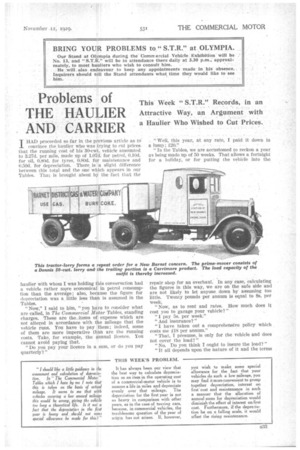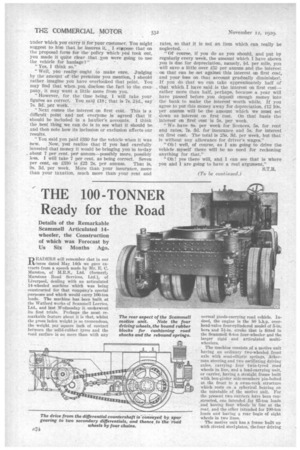I . HAD proceeded so far in the previous article as
Page 203

Page 204

If you've noticed an error in this article please click here to report it so we can fix it.
.to convince. the haulier who was trying to cut pricesthat the running cost of his 30-cwt. vehicle amounted. to 3.27d. per mile, made up of 1.07d. for petrol; 0.10d. for oil, 0.80d, for tyres. 0.80d. for maintenance and 0.50d. for depreciation. There_ is a slight difference. between this total and the one which appears in our Tables. That is brought about by the fact that the
haulier with whom I was holding this conversation had a vehicle rather more economical in petrol consumption than the average; also, because the figure for depreciation was a little less than is assumed in the Tables.
"Now," I said to him, "you have to consider what are called, in The Commercial Motor Tables, standing charges. These are the items of expense which are not altered in accordance with the mileage that the vehicle runs. You have to pay them; indeed, some of them are more imperative than are the running costs. Take, for example, the annual licence. You cannot avoid paying that.
"Do you pay your licence in a sum, or do you pay quarterly?" . " Well, this year, at any rate, I paid. it down in a lump; £20." • .• • . . • "In the Tables, we are accustomed to reckon a year as being made up of 50 weeks. That allows a fortnight for a holiday, or for putting the vehicle into the repair shop for an overhaul. In any case, calculating the figures in this way, we are on the safe side and are not likely to let anyone, down by assuming too little. Twenty pounds per annum is equal to 8s. per week.
"Now, as to rent and rates. How much does it cost you to garage your vehicle?" • "I pay 5s. per week."
"And insurance?"
"1 have taken out a Comprehensive policy which costs me 118 per annum."
"That, I presume, is only for the Vehicle and does not cover the load?"
"No. Do you think I ought to insure the load?" "It all depends upon the nature of it and the terms
THE COMMERCIAL MOTOR 532
• 'nder which you carrY it for your customer. You might suggest to him that he insures it.. Istippose that on the proposal form for the policy which you took out, you made it quite clear that you were going to use the vehicle for haulage?'
"Yes, I think so."
"Well, you really ought to make sure_ Judging by the amount of the premium you mention, I should rather imagine you have overlooked that point. You may find that when .you disclose the fact to the company, it may want a little more from you.
"However, for the time being, I will take your figures as correct. You said £18; that is 78. 21(1., say 7s. 3d: per week. •
"Next comes the interest on first coSt. This is a difficult point and not everyone .is agreed that it should be included in a haulier's accounts. I think the ,best thing we can do is to see what it should he and then note how its inclusion or exclusion affects our results.
" You said you paid £330 for the vehicle when it was new. Now, yod realize that if you had carefully invested that money it would be-bringing you in to-day about 7 per cent. peP annum—possibly more, possibly less. I will take 7 per cent, as being correct. Seven
per cent, on 1330 is £23. 2s. per annum. That is, Os. 3d. per week. More than your insurance, more than your taxation, much more than your rent and
rates, so that it is not an item which can really be neglected. .
"Of course, if you do as you should, and put by regularly every week, the amount which I have shown you is due for depreciation, namely, Id. per mile, you will save a little over £52 per annum and the interest on that can be set against this interest on first cost, and your loss on that account gradually diminished. If you do that we can take approximately half of that which I have said is the interest on first cost— rather more than half, perhaps, because a year will have passed .before you deposit enough money into the bank to make the interest worth while. If you agree to put this money away for depreciation. £12 10s. per annum will be the amount which we must set down as interest on first cost. On that basis the interest on first cost is 5s. per week.
"We have 8s. per week for licences, 5s. for rent and rates, 7s. 3d. for insurance and 5s. for interest on first cost. The total is 25s. 3d. per week, but that is without any allowance for driver's wages." ' " Oh ! well, of course, as I am going to drive the vehicle, myself there will be no need for reckoning anything for that."
S.T.R.








































































































































































































































































































































